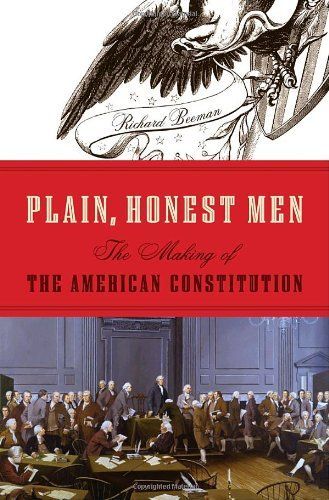
Plain, Honest Men The Making of the American Constitution
“While some have boasted it as a work from Heaven, others have given it a less righteous origin. I have many reasons to believe that it is the work of plain, honest men.” –Robert Morris, delegate from Pennsylvania to the Constitutional Convention From distinguished historian Richard Beeman comes a dramatic and engrossing account of the men who met in Philadelphia during the summer of 1787 to design a radically new form of government. Plain, Honest Men takes readers behind the scenes and beyond the debate to show how the world’s most enduring constitution was forged through conflict, compromise, and, eventually, fragile consensus. The delegates met in an atmosphere of crisis, many Americans at that time fearing that a combination of financial distress and civil unrest would doom the young nation’s experiment in liberty. When the delegates began their deliberations in May 1787, they discovered that a small cohort of men, led by James Madison, had prepared an audacious plan–revolutionary in its view of the nature of American government. The success of this bold and brilliant strategy was far from assured, and the ultimate outcome of the delegates’ labors–the creation of a frame of government that would enable America to flourish–was very different from what Madison had envisioned when he launched his grand scheme. Beeman captures as never before the dynamic of the debate and the characters of the men who labored that summer in Philadelphia, among them James Madison, as brilliant as he was unprepossessing; the mercurial Gouverneur Morris of Pennsylvania, arrogant, combative, but ultimately effective in shaping the language of the completed Constitution; Maryland’s Luther Martin, a pugnacious (and often inebriated) opponent of a strong national government; Roger Sherman, the straightforward Connecticut delegate who helped broker some of the key compromises of the Convention; and General George Washington, whose quiet dignity and forceful presence helped keep under control the clash of egos and words among the delegates. Virtually all of the issues the delegates debated that summer–the extent of presidential power, the nature of federalism, and, most explosive of all, the role of slavery–have continued to provoke conflict throughout the nation’s history. Plain, Honest Men is a fascinating portrait of another time and place, a bold and unprecedented book about men, both grand and humble, who wrote a document that would live longer than they ever imagined. This is an indispensable work for our own time, in which debate about the Constitution’s meaning still rages.
Reviews
Sara Piteira @sararsp